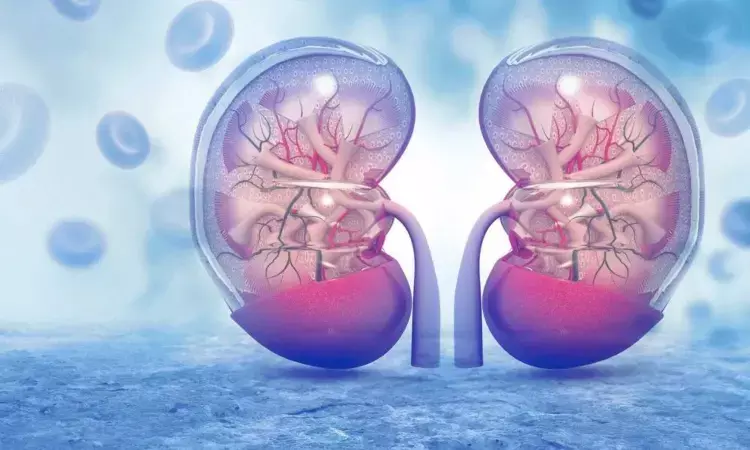- Home
- Medical news & Guidelines
- Anesthesiology
- Cardiology and CTVS
- Critical Care
- Dentistry
- Dermatology
- Diabetes and Endocrinology
- ENT
- Gastroenterology
- Medicine
- Nephrology
- Neurology
- Obstretics-Gynaecology
- Oncology
- Ophthalmology
- Orthopaedics
- Pediatrics-Neonatology
- Psychiatry
- Pulmonology
- Radiology
- Surgery
- Urology
- Laboratory Medicine
- Diet
- Nursing
- Paramedical
- Physiotherapy
- Health news
- Fact Check
- Bone Health Fact Check
- Brain Health Fact Check
- Cancer Related Fact Check
- Child Care Fact Check
- Dental and oral health fact check
- Diabetes and metabolic health fact check
- Diet and Nutrition Fact Check
- Eye and ENT Care Fact Check
- Fitness fact check
- Gut health fact check
- Heart health fact check
- Kidney health fact check
- Medical education fact check
- Men's health fact check
- Respiratory fact check
- Skin and hair care fact check
- Vaccine and Immunization fact check
- Women's health fact check
- AYUSH
- State News
- Andaman and Nicobar Islands
- Andhra Pradesh
- Arunachal Pradesh
- Assam
- Bihar
- Chandigarh
- Chattisgarh
- Dadra and Nagar Haveli
- Daman and Diu
- Delhi
- Goa
- Gujarat
- Haryana
- Himachal Pradesh
- Jammu & Kashmir
- Jharkhand
- Karnataka
- Kerala
- Ladakh
- Lakshadweep
- Madhya Pradesh
- Maharashtra
- Manipur
- Meghalaya
- Mizoram
- Nagaland
- Odisha
- Puducherry
- Punjab
- Rajasthan
- Sikkim
- Tamil Nadu
- Telangana
- Tripura
- Uttar Pradesh
- Uttrakhand
- West Bengal
- Medical Education
- Industry
Rare Case of Valacyclovir Toxicity Reported in Elderly Woman with Single Kidney

USA: In a rare clinical occurrence, an elderly woman with a history of nephrectomy developed both neurotoxicity and acute kidney injury (AKI) following the administration of valacyclovir, according to a case report recently published in BMC Nephrology by Dr. Sondos Badran and colleagues from the Department of Internal Medicine, Arrowhead Regional Medical Center, California.
Valacyclovir, a widely used antiviral agent and prodrug of acyclovir, is frequently prescribed to treat infections such as herpes zoster and herpes simplex. Its favorable pharmacokinetic profile, particularly improved oral bioavailability compared to acyclovir, makes it a common choice in clinical practice. The medication is generally considered safe, with commonly reported side effects including gastrointestinal discomfort, headache, and elevated liver enzymes. However, serious complications like thrombotic thrombocytopenic purpura and nephrotoxicity are exceedingly rare.
The report details the case of a 71-year-old woman who presented to the emergency department with new-onset visual and auditory hallucinations after taking valacyclovir for two days to treat shingles. Her medical history included chronic kidney disease (CKD), left-sided nephrectomy due to renal agenesis and nephrolithiasis, type 2 diabetes, hypertension, and hyperlipidemia. Laboratory investigations revealed markedly elevated serum creatinine levels (6.19 mg/dL), indicating acute kidney injury (AKI).
The patient’s neuropsychiatric symptoms and renal dysfunction raised suspicion for valacyclovir toxicity. The antiviral was discontinued, and the patient was closely monitored throughout her hospitalization. There was a gradual improvement in renal function, accompanied by a resolution of the neurotoxic symptoms.
The authors highlighted that while nephrotoxicity associated with valacyclovir is uncommon, it can occur through mechanisms such as crystal-induced tubular obstruction, tubular dysfunction, or tubulointerstitial nephritis. Notably, this case is unique because the adverse effects occurred despite standard dosing and in the absence of known overdose. The presence of a solitary kidney may have rendered the patient particularly vulnerable to these complications.
Dr. Badran and the team emphasized the diagnostic challenge in such scenarios, especially when a renal biopsy is not feasible due to the risks associated with a single kidney. In such cases, a detailed medication history and clinical assessment are vital for timely identification and intervention.
The case emphasizes the need for heightened vigilance when prescribing valacyclovir to patients with compromised renal function or a history of nephrectomy. Clinicians are urged to consider drug-induced toxicity when encountering AKI or neurological symptoms in this patient population.
The authors recommend that further large-scale retrospective studies or meta-analyses be conducted to explore potential dose-related toxicity patterns of valacyclovir, particularly in patients with reduced renal reserve. Early recognition and withdrawal of the offending agent remain key to preventing long-term complications.
Reference:
Badran, S., Li, S., Nguyen, S. et al. Valacyclovir-induced neurotoxicity and nephrotoxicity in an elderly patient with a history of nephrectomy: a case report. BMC Nephrol 26, 269 (2025). https://doi.org/10.1186/s12882-025-03941-7
Dr Kamal Kant Kohli-MBBS, DTCD- a chest specialist with more than 30 years of practice and a flair for writing clinical articles, Dr Kamal Kant Kohli joined Medical Dialogues as a Chief Editor of Medical News. Besides writing articles, as an editor, he proofreads and verifies all the medical content published on Medical Dialogues including those coming from journals, studies,medical conferences,guidelines etc. Email: drkohli@medicaldialogues.in. Contact no. 011-43720751


